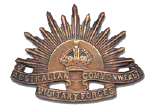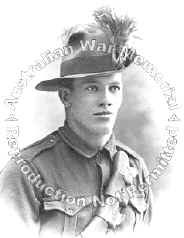 |
|
|||
|
Discipline in the AIF in WW1 |
|
 |
171 Private William Harold Kenny an original member of the 2nd Light Horse Regiment. Kenny was also an original member of the Military Mounted Police (MMP), he joined that unit in March of 1915, and served as MMP on Gallipoli, and then transferred into the newly formed ANZAC Provost Corps, which was later renamed the Australian Provost Crops, in which he served until he returned to Australia on 24 September 1918. He was a bodyguard to General Birdwood on Gallipoli and later in France. He was awarded the DCM and French Medaille Militaire and at the end of the war held the rank of Warrant Officer Class 2. He is the brother of Sister Elizabeth Kenny of polio fame and a member of the Australian Army Nursing Service (AANS). |
| London 1918. An English Major, red in the face with anger approaches an Aussie Major in the street. "I say" he asks "are those chaps over there yours?" The Aus has a look and replies "Yair, looks like it". "Well" says the Pom "they just called me a silly old bastard. What are you going to do about it?" Well, you're not are you?" asks Aus. "Of course not" fumes the Pride of England. "Well, run over there and tell 'em that they're bloody liars" answered the Digger officer. |
| There was always going to
be a huge difference between what the English army thought of as
discipline and the attitude of the "damned colonials". The
English system was (almost) class warfare and the AIF was built on
meritocracy. Aussies often called their officers 'Skipper', 'Digger',
'Boss' or by his name. The Poms could not understand or agree with that
attitude. One has only to compare the attitude of Haig and Monash to see
the difference.
The AIF was a volunteer force of civilians who joined up "for the duration of the war plus 4 months". In other words they were there to do a job. Their attitude was, "Let's do the job and go home and get out of this silly bloody uniform". There was no widespread desire at any rank level for a full time army career. Not even at the top level. There was also a feeling that a man should be measured by his actions not by some baubles on his shoulder boards.What follows is a few bits and pieces I have picked up over the years. Just give me a mo, I will check with the Boss to see if that's alright. "Hey, Skipper... |
| During Third Ypres
Lieutenant P. King of the 2/5th Bn. East Lancashire Regiment, was stuck
with a small left-over of his company in the mud near Poelcapelle. The men
were exhausted, had been under constant fire for two days and desperate
for relief, but no one seemed even to know that they were there.
Lt King had already began to wonder whether his company had been secretly chosen to be a suicide force. King wrote
|
| In February 1918 Haig wrote in a letter to his wife: "We have had to separate the Australians into Convalescent Camps of their own, because they were giving so much trouble when along with our men and put such revolutionary ideas into their heads." |
Unlike their British
colleagues, common Australian soldiers were not treated like ignorant
fools, but like individuals who will function better in a team when
they know their collective aim. The Australian Lieutenant-General Sir John
Monash, successor of Birdwood, said:
"Very much and very stupid comment has been made upon the discipline of the Australian soldier. That was because the very conception and purpose of discipline have been misunderstood. It is, after all, only a means to an end, and that end is the power to secure coordinated action among a large number of individuals for the achievement of a definite purpose. It does not mean lip service, nor obsequious homage to superiors, nor servile observance of forms and customs, nor a suppression of individuality... the Australian Army is a proof that individualism is the best and not the worst foundation upon which to build up collective discipline." |
| "Mind you, the Yanks and the Aussies were
disgusted at the way our officers treated us. There were cases where
British officers tried to put Yanks or Aussie
soldiers in front of a firing-squad but couldn't get away with
it. If they had, I reckon those countries would have pulled out of the war
and left us to it. There was a big riot about September 1917 by the
Australians at a place called Etaples. They called it "collective
indiscipline", what it was, was mutiny. It went on for days. I think a
couple of military police got killed. Field Marshall Haig would have shot
the leaders but dared not of course because they
were Aussies".
William Brooks, British Army 1915/19 in an interview in 1993. |
| Some punishments however
were not forced down on Australian troops. Though liable to be executed
for mutiny, desertion to the enemy or treachery, the 129 Australians
(including 119 deserters) that were sentenced to death during the war (117
in France) were not shot.
The 1903 Australian Defence Act stipulated that the Governor General of Australia had to confirm the sentences passed by courts-martial - and he never endorsed the sentences. Although Haig made strong representations for power to inflict the extreme penalty upon Australian soldiers, the sanction was continually denied. (Shades perhaps of the "Breaker" Morant story) A major consideration was the Australian soldier's status as a volunteer, and that as such, these men should not be subject to the extreme penalty. After all - enough men were killed already. More than 61,000 Australians died in this war, mostly on the Western Front. Australia's casualty rate was, relatively, the highest of all allied nations. (See Shot at Dawn below) |
| The Aussies never took to the Portuguese troops that they came across. One night Bluey is on his way back from a good time that included several bottles of Vin Ordinaire. A Portuguese Officer that he ignored became very VERY excited and demanded that Bluey salute him, or face the consequences. Says Blue, "Listen cobber, I don't salute our own bleeding officers so why in Gawd's name would I salute a Pork 'n Cheese bloke". |
| Dave was convalescing from a wound and the Matron, a rather sharp English lady, had detailed him to clean out the sinks in the hospital dispensary. Coming back an hour later she found Dave reading a medical book and the sinks untouched. "Private Smith" she snapped "what's this? Why aren't those sinks cleaned?" "Ain't got no rags" says Dave. "Well" snorted the angry Matron, "you've got a tongue haven't you?". "Oh, yair" says Dave, "but I ain't got a neck like a blasted emu". |
| SHOT
AT DAWN. British and Commonwealth military
command executed 306 of its own men during the Great War. Those shot
brought such shame on their country that nearly a century on, their names
still do not appear on official war memorials.
Those condemned to death usually had their sentences confirmed by Field Marshall Sir Douglas Haig on the evening following their court-martial. Pte Thomas Highgate was the first to suffer such military justice. Unable to bear the carnage (of the death ) of 7,800 British troops at the Battle of Mons, he had fled and hidden in a barn. He was undefended at his trial because every one of his comrades from the Royal West Kents had been killed, injured or captured. Just 35 days into the war, Pte Highgate was executed at the age of 17. Many similar stories followed among them that of 16 year-old Herbert Burden, who had lied that he was two years older so he could join the Northumberland Fusiliers. Ten months later, he was court-martialled for fleeing after seeing his friends massacred at the battlefield of Bellwarde Ridge. He faced the firing squad still officially too young to be in his regiment. 10 April 2000 - The Prime Minister of New Zealand announced a review of the cases of five soldiers executed for desertion, with a view to a pardon by virtue of the Pardon for Soldiers of the Great War Bill. Mark Peck, the Member of Parliament for Invercargil, whose Bill prompted this review, returned to his desk one evening following a parliamentary discussion on the subject, to find a white feather had been laid upon it. ( A white feather was the universal emblem of cowardice in 1914/18) (It should be noted that the Australian Govt./Army refused to execute any soldier during World War One). |
| Another way? It was during this early stay in Egypt that absence without leave became common. Most of the offenders were old soldiers who had served in the Boer War and were still unsettled in their habits. The New Zealand force found a remedy by returning the more troublesome men to New Zealand and soon after this General Bridges inflicted the same punishment on miscreant Australians. For nearly 2 years this remained the supreme punishment in the AIF. (from 'Digger' by John Laffin) |
